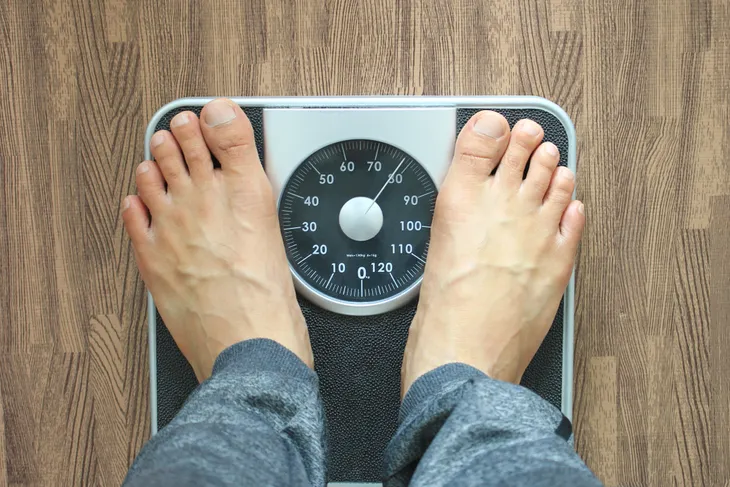Gout is a form of arthritis that can affect anyone, including myself. It’s considered one of the most painful rheumatic conditions. Affecting about 54.4 million adults in the U.S. alone, it is estimated that 1 in 4 people have gout. While there is no cure, there are things that can be done to better manage and treat the condition.
If you’ve recently been diagnosed with gout and are feeling a little overwhelmed, don’t worry! I’ve created this list with some of the biggest lessons i’ve learned since being diagnosed with gout. Check it out…
Manage Your Weight
Before I was diagnosed with gout, I weighed 240 pounds. I was considered centrally obese, meaning I was carrying excess weight in my middle belly. That extra weight took a toll on my joints, not to mention, it made me more prone to those very painful gout attacks.
When I learned that this condition would follow me for the rest of my life, I had to make some serious changes, starting with my weight. I had to lose 45 pounds in order to go back to my ideal weight.
Why is maintaining a healthy weight important? To start, shedding excess pounds will lift the burden off your joints. You’ll feel less pain and swelling in those areas without the weight of any extra pounds. Weight loss will also reduce the uric acid levels in your blood.
To get to your ideal weight, you need to be doing a combination of diet and exercise (more on that later). Just be sure that you are losing it gradually. If you lose weight too fast, it will increase the uric acid in your body causing you to have a gout attack.
You want to keep it at 1-2 pounds of weight loss per week. This is great because you can also make the lifestyle changes gradually, making it more sustainable for you in the long run.
Get Active
Exercise may be the last thing on your mind when your joints are so sensitive. However, this is exactly what you need to help make your situation better. Being inactive will only weaken your joint and muscles, resulting in more painful gout attacks later on.
By exercising, you not only get to your ideal weight faster, you also help strengthen your joints. That’s in addition to its other benefits such as a healthy heart, stronger bones, better energy levels, enhanced well-being, and better sleep.
I struggled with getting active, but I knew I had to do it. Avoiding trigger foods alone wasn’t going to cut it. Some good exercises that gout sufferers can do include stretching exercises, strength exercises, range of motion exercises, and cardio. Just be watchful of your feet as this area is more prone to gout attacks.
Start small in the beginning, doing exercise 15 minutes each day for five days a week. Then slowly build up from there. No matter how light the exercises may be, the more important thing is that you stay consistent. Over time, you’ll have a workout routine that will be beneficial to your gout condition in the long run.
Follow the Gout Diet
Diet was another big thing I had to change because of gout. If anything, it’s one of the most impactful things that you can do to help reduce your symptoms. Gout sufferers should ideally have a diet consisting of 80-percent complex carbohydrates, 10-percent fat, and 10-percent protein.
Complex carbs should come from fruits, vegetables, whole grains, whole wheat pasta, and rice. These carbs help fuel your body, keeping you full throughout the day. And they’re healthy too so you get to enjoy the benefits from the vitamins and nutrients that they provide.
Fats can be from dairy, eggs, avocado, nuts, seeds, olive oil, and yogurt. These contribute to keeping you full as well as giving your body the energy it needs to work properly. The right kind of fat such as the ones mentioned will help you achieve this. Meanwhile, unhealthy fat that comes from red meat, processed meat, and pastries will affect your body’s ability to process uric acid efficiently.
Lastly, there’s protein which should come from poultry, fish, and nuts. This is essential for building and maintaining your bones and muscles. Normally, we look to red meat for our protein needs but since they’re high in purines, they should be limited as much as possible.
Avoiding processed foods is also key to a healthy gout diet. This will help to decrease your uric acid levels and prevent free radicals that’s causing many of today’s diseases.
It’s going to be a challenge at first since most of the stuff you find at the supermarket these days are processed. Just stick to the perimeter side of the grocery store where you’ll have access to whole fresh foods.
Avoid Alcohol
Having gout requires you to give up certain trigger foods such as seafood and sugar. However, one thing I really prioritized was alcohol. It’s one of the biggest offenders of gout because of its high purine content. It comes as no surprise that if you have gout, you drink more alcohol than the average person.
I’m guilty of this and had to drastically reduce my alcohol consumption in order to avoid those dreadful gout flares. In my quest to be more mindful of my alcohol intake, I also learned that most beers in the market contain ingredients that are actually bad for you.
For example, did you know that Corona uses GMO corn syrup in their formula? Guiness uses high fructose corn syrup, and sometimes fish bladder. Yum! Budweiser isn’t any better as they use GMO corn. Miller Lite too with their corn syrup to make their beer taste sweet.
It’s no wonder why they’re the biggest offenders for gout. Aside from the alcohol content and yeast, they contain artificial sweeteners which are known to increase uric acid levels.
Learning how dirty the beer industry was enough to put me off beer. Nowadays, I don’t go for your regular American beer at the supermarket. If I really want the occasional pint, I’ll go for organic beer that’s been brewed locally using organic ingredients.
The same goes for hard liquor as well. If you enjoy drinking, gin, vodka, rum, whiskey, tequila, or brandy, you may want to cut down on those too as they are also high in purines. Their higher alcohol content makes them just as bad as beer.
Sadly, wine is not exempt either as it’s been known to lead to gout attacks.
Now onto you. What was the #1 lesson you learned living as a gout sufferer? Share your thoughts in the comments below.







